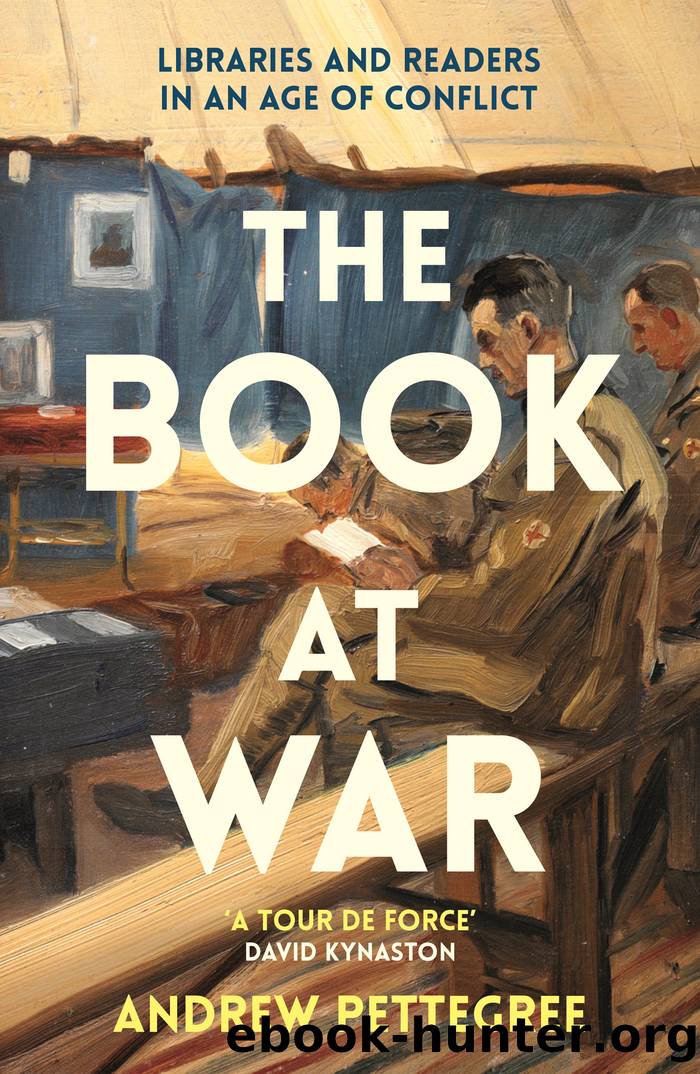The Book at War: Libraries and Readers in an Age of Conflict by Andrew Pettegree

Author:Andrew Pettegree [Pettegree, Andrew]
Language: eng
Format: epub
Tags: History, Europe, General, Military, Literary Criticism, Language Arts & Disciplines, Library & Information Science, Archives & Special Libraries, Antiques & Collectibles, Paper Ephemera, World
ISBN: 9781800814950
Google: te-qEAAAQBAJ
Amazon: B0BTK1SLDV
Publisher: Profile Books
Published: 2023-10-04T19:00:00+00:00
The British propaganda campaign, to which its leading authors contributed so enthusiastically, was in this respect wholly successful. America entered the war on the Allied side in 1917, and the British public remained largely oblivious of the realities of life at the front. Arguably, this was ultimately to the disadvantage of the war effort, throwing a protective blanket over the follies of army strategy, and thus ensuring that the slaughter of the trenches would continue. The British authors who contributed to this outcome were all in their way men of sensibility, and this is evident at least in their fiction even before warâs end. In the Richard Hannay novels, Buchan allowed his fictional characters to be far more reflective of the doubts entertained by real soldiers, compared to their newspapers surrogates. In Greenmantle (1916), Richard Hannay, on the run in Germany, is given succour in a woodland cottage. âThat night I realised the crazy folly of war.â Blenkiron, his rich, corpulent and fearless accomplice, is even allowed to muse, âWe in America respect the fighting of the British soldiers, but we donât quite catch on to the devices of the British generals. We opine that there is more bellicosity than science among your highbrows. That is so?â7
The war ended with Buchan and Bennett duelling over the post-war future of the Ministry of Information. Buchan, the decorated officer, prevailed, and Bennett returned to his career as a novelist. It was in the years of peace, responding to their different wartime experiences, that writers reflected more systematically on the folly of war, and their own responsibility for its perpetuation. John Galsworthyâs The Burning Spear (1919) is a complex satire of the Ministry of Information, which ends with its protagonist, a Don Quixote figure, failing in his attempt to immolate himself on a pyre of war propaganda books, pamphlets and newspapers. Arnold Bennett also published a fictional satire of his war work in Lord Raingo (1926), where the eponymous hero (based on Lord Beaverbrook) duels with the odious Andy Clyth (Lloyd George). The most substantial and enduring of these therapeutic efforts at cleansing and exculpation is Ford Madox Fordâs Paradeâs End (1924â8). Ford, who had only recently adopted this anglicised name, had, as Ford Madox Hueffer, rather unexpectedly abandoned a life of bohemian dissipation and scandal to join up for what proved to be a miserable life as a junior officer. Paradeâs End, published in four discrete parts, reflected in full this disillusionment and seriousness.
None made the transition from a conception of the cleansing joy of war to disillusioned heartbreak more completely than the arch-Imperialist Rudyard Kipling, whose only son John had been posted missing in the first Battle of Loos in 1915. It was only after many months, and thanks to the efforts of fellow author Henry Rider Haggard, that it could be confirmed that John was dead (an agonising death of which Rider Haggard spared the grieving father the details). Kipling never really recovered from this blow, and in taking on
Download
This site does not store any files on its server. We only index and link to content provided by other sites. Please contact the content providers to delete copyright contents if any and email us, we'll remove relevant links or contents immediately.
The Power of Myth by Joseph Campbell & Bill Moyers(1057)
Half Moon Bay by Jonathan Kellerman & Jesse Kellerman(979)
Inseparable by Emma Donoghue(976)
A Social History of the Media by Peter Burke & Peter Burke(976)
The Nets of Modernism: Henry James, Virginia Woolf, James Joyce, and Sigmund Freud by Maud Ellmann(900)
The Spike by Mark Humphries;(809)
The Complete Correspondence 1928-1940 by Theodor W. Adorno & Walter Benjamin(783)
A Theory of Narrative Drawing by Simon Grennan(775)
Culture by Terry Eagleton(771)
Ideology by Eagleton Terry;(733)
World Philology by(712)
Farnsworth's Classical English Rhetoric by Ward Farnsworth(711)
Bodies from the Library 3 by Tony Medawar(708)
Game of Thrones and Philosophy by William Irwin(707)
High Albania by M. Edith Durham(699)
Adam Smith by Jonathan Conlin(687)
A Reader’s Companion to J. D. Salinger’s The Catcher in the Rye by Peter Beidler(686)
Comic Genius: Portraits of Funny People by(649)
Monkey King by Wu Cheng'en(647)
